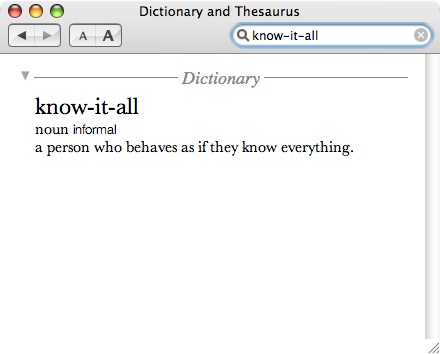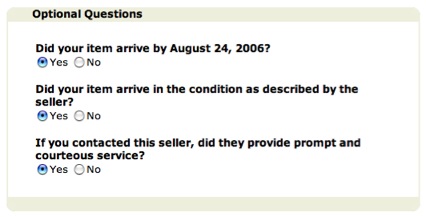Singular They Sighting: Oxford American Dictionaries

I nearly always keep this application open when I am writing or studying to double-check the meaning of a word or look for a synonym. I was looking for another word that meant "know-it-all" for my Wycliffe post when I unexpectedly stumbled across the use of a singular they in the phrase's definition:

Sign of the End Times: Singular They in the ESV
“Whoever keeps his commandments abides in him, and he in them.” (1John 3:24, ESV).
The change in person from the Greek is undeniable: καὶ ὁ τηρῶν τὰς ἐντολὰς αὐτοῦ ἐν αὐτῷ μένει καὶ αὐτὸς ἐν αὐτῷ. The last word in the Greek, αὐτῷ, is a 3rd person singular which is literally him. But in the ESV, αὐτῷ is translated as them, a 3rd person plural (which is technically a gender neutral/inclusive change to boot!). Consider the very literal rendering of the NASB: "The one who keeps His commandments abides in Him, and He in him." This may be the one instance where I approve of capitalizing pronouns for deity, because without them the verse would be very confusing if translated literally.
For the ESV to contain a singular use of they is highly ironic because some of the minds behind the ESV--particularly Grudem, Poythress, and Ryken--have been very critical of the TNIV's use of the singular they in verses such as Rev 3:20, and elsewhere (including 1 John 3:24). In fact, at www.genderneutralbibles.com, the changing of pronouns is labeled as an inaccurate translation practice:
This verse also illustrates another serious result of systematically changing singulars to plurals in thousands of cases: The TNIV will ultimately lead to a loss of confidence in tens of thousands of plural pronouns in the Bible. Preachers and Bible teachers cannot rightly use the TNIV to make a point based on the plurals “they/them/their/ those” or the second person pronouns “you/your/yours” because they can no longer have confidence that those represent accurately the meaning of the original. Maybe the original was plural ("their") but then again maybe "their" is a gender-neutral substitute for a singular ("his"). Maybe the original was 2nd person ("you") but then again maybe “you” is a gender-neutral substitute for a 3rd person singular pronoun ("he") or a singular noun ("a man"). How can ordinary English readers know? They can’t. So no weight can be put on those pronouns. “He” in the NIV has become “we” or “you” or “they” in the TNIV thousands of times.
Such criticism is surprising not only because of 1 John 3:24 in the ESV, but also the recent demonstration that the ESV translators changed pronoun person AND number in verses such as in Hosea 2:6 and Hosea 2:14 merely for the sake of clarity (the same thing for which they criticize the TNIV translators for doing).
A few weeks back, I suggested in another blog entry that a sign of acceptance for any change in grammar is its use in respectable literature. I used the TNIV as evidence that the singular they was becoming acceptable (again) from a grammatical standpoint. So, surely when such changes in grammar are also used by the very people who deplore the change (the ESV translators), it must be even greater proof that the change is not only becoming acceptable, but inevitable. Or maybe it's just a sign of the end times
What's the real story here? The use of them for αὐτῷ in the ESV rendering of 1 John 3:24 comes from the legacy of the RSV which reads, "All who keep his commandments abide in him, and he in them." As standard practice the RSV (rightly) did not capitalize pronouns referring to deity. So to keep from confusing the reader, the RSV translators changed the singular ὁ τηρῶν ("the one keeping" or "the one who keeps") to a plural ("all"). In changing the antecedent subject to a plural, it was necessary to change the corresponding pronoun to a plural as well ("them").
What's interesting is that the ESV translators, in revising the RSV, changed the subject in 1 John 3:24 back to a singular, but failed to do change back the corresponding pronoun to match its antecedent. Why? Well, my hunch is that in keeping with the reality that the use of singular they has never left informal modes of communication and therefore sounds perfectly natural to most hearers, I believe the ESV translators simply overlooked it. And this is case in point for what I've said previously: the ESV feels very much like a translation that was rushed. I will be very interested to see if the upcoming revision to the ESV doesn't fix this verse, and if I were a betting man (I'm not), I would guess that 1 John 3:24 is altered in the revised ESV.
Look, I've got quite a few friends who use the ESV as their primary Bible. Fine. I use the ESV in parallel with other translations, but not as a primary Bible. In spite of that, I would by and large recommend the ESV over many of the translations of a generation ago. I strongly believe in using modern translations of the Bible for a variety of reasons. But having said all that, I must state that I really don't like the Bible wars because they just seem to get too nasty and they detract us from our mission to reach a lost and dying world with the hope-filled message of the Good News of Jesus Christ.
Therefore, in light of the ESV's use of a singular they, AND in light of the ESV's alteration of person and number in the pronouns of Hosea 2 (and possibly elsewhere), I propose a truce in the Bible wars. If God speaks to you through the ESV, then praise the Lord for it. But if God speaks to me through the TNIV; and to my wife through the NLT; and to even another through the NRSV, NASB, NIV, CEV, GNB, or whatever--let's just all thank God that he not only communicated his will and his saving acts in history through a written record that we call the Bible, but also that we have a variety of translations in our own language in which to read it. And let us no longer think ill toward or look down upon those who read a different translation than we do ourselves. There are more pressing issues at hand...
More on "Singular They": Step 2.5
1. The change begins in oral speech and informal writing.
2. The change shows up in respectable literature.
3. The change is demonstrated in most grammar books as new editions are published.
The steps above are simply from my observation; but I do have a degree in English, so I've had enough experience in the area to see such things take place.
Not all forms of currently unacceptable English will eventually become acceptable. And just because something's used widely at a popular level still doesn't mean it will become acceptable. "Ain't" has not become acceptable in formal grammar and probably never will. The same goes for most slang. Currently, there's greater laxity toward things like split infinitives and prepositions at the end of sentences, but official acceptance is still slow. And in my opinion, there's nothing wrong with slow acceptance of changes. Ultimately these are rules that we agree upon as a civilized society, and they should not be made too quickly.
The English language, contrary to the wishes of traditionalists, is never static. When I was in college, I took a class in 1988 called "Advanced Grammar," which was actually a fairly enjoyable class despite the name. In that class, our main grammar was Descriptive English Grammar, written in 1931 by Homer C. House and Susan Emolyn Harmon. We used the second edition which was a revision by Harmon published in 1950. Our teacher chose this book because she said she liked it better than any of the current grammar books. However, during our instruction, she regularly told us to ignore this or that rule because it was no longer standard practice. I found this ironic since she had praised the merits of this book so strongly on the first day of our class. Nevertheless, it demonstrated that the English language had changed greatly between 1950 and 1988--so much so that we had to make annotations in our grammar book because it was out of date.
Language has also changed considerably since I was in college. When I was getting my undergraduate degree, masculine universals (man, mankind, he, his--used to represent both genders) were just beginning to be questioned. I remember sitting in an English class where we took a vote that masculine universals were fine and acceptable. The vote was unanimous or very near it--even from the most feminist spirits in the class (and there were a few). I naively thought we had settled the issue, but we had not.
Practically every grammar book published today has sections on sexist language that includes alternatives to words man, mankind, manmade, etc. Even the SBTS style guide has en entire chapter on gender language (see ch. 7, pp. 103-105) which is adapted from the Corporate Editorial Manual of Lifeway Christian Resources. And when addressing their congregations, I hear even the most conservative of preachers using "brothers and sisters," "his or her," and the "dreaded" singular they.
What possessive pronoun would you supply in the sentence below?
Someone left ____________ book in the room.
Very few these days will fill in the blank with his anymore. When I present this sentence to my students, almost all of them will write "their."
As I mentioned above, not all forms of communication in common use will become accepted as standard grammar. The singular they is different, however, because there's a need for it. Here are three reasons why it will become accepted in most standard grammars:
1. The use of "his" (a masculine universal) is no longer standard practice. I notice even the most conservative writers and speakers going out of their way to avoid it. Whether this is conscious avoidance or not, I do not know.
2. There is no inclusive pronoun in English language for reference to humans as there is in other languages, but the need for such usage is part of our day-to-day communication.
3. The use of the singular they goes back hundreds of years in English usage despite the rules of 20th century grammars. Therefore, it has strong precedent.
All of this brings me to the title of this blog entry. Whenever I teach a writing class, we go over this issue as soon as I hand back their first papers. Usually, a large sampling of the papers include the use of a singular they that does not agree in number with the subject in the sentence. I mark such "errors" not to take off points, but because I want my students to think through the syntax of the sentences they are writing. And I jokingly tell them I will quit marking such sentences when the grammar books change their rules regarding the use of the singular they--and I believe they will.
If you have a copy of the Prentice Hall Guide, the reference can be found on p. 117. Surprisingly, this is not in a section on gender/sexist language but in pronoun reference, specifically on indefinite pronouns.
The writers note that "He was traditionally used to refer to indefinite pronouns ending in -body and -one." Then four strategies are presented "to avoid the exclusive use of the masculine pronoun when the reference is to both males and females. This includes the use of "his or her" (personally my least favorite solution) and changing the subject to a plural. But then I saw it: "Use the plural pronoun." An example was cited: "Everyone has their coat."
I was shocked. How long have I been using this book with my classes--three years now? However, then I noticed the disclaimer: "Some people view this as incorrect. Others, such as the National Council of Teachers of English accept this as a way to avoid sexist language."
So, it's allowed, but with a disclaimer--not quite 100% acceptance yet according to Prentice Hall, but acceptable to some nonetheless. Where does this fit in with the three stages of acceptance I described at the beginning of this blog entry? Well, the singular they is at least at a level two because its quickly becoming more used in print--the most prominent example I know of is in the TNIV Bible. Grammar books are starting to discuss it, but wide endorsement is not quite there (yet). But the recommendation to use their as a singular pronoun possessive in the Prentice Hall Guide makes me put its acceptance at a 2.5 (not quite a full "3" because the writers felt a disclaimer was necessary). When future editions of this book and other grammar and usage books allow for it without qualifiers, we'll know that the singular they has been fully accepted.
So in the meantime, I'm still marking it on my students' papers.
*I noticed in looking at Amazon.com that a 6th edition of the Prentice Hall Guide is in print (see link above). My guess is that my students have been receiving this for over a year, but I still have the old edition and didn't even know it was updated. I have requested a new copy.
"Singular They" Sighting #1
I'm slowly getting used to the "singular they." It's already a standard in spoken dialogue, and it's here to stay--like it or not.
This example comes from Amazon.com where I was leaving feedback for a used book transaction. Notice the third question.










